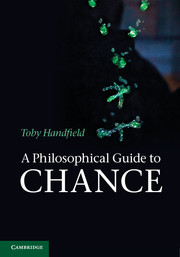Book contents
- Frontmatter
- Contents
- Preface
- 1 The concept of chance
- 2 The classical picture: What is the world made of?
- 3 Ways the world might be
- 4 Possibilities of thought
- 5 Chance in phase space
- 6 Possibilist theories of chance
- 7 Actualist theories of chance
- 8 Anti-realist theories of chance
- 9 Chance in quantum physics
- 10 Chance in branching worlds
- 11 Time and evidence
- 12 Debunking chance
- References
- Index
8 - Anti-realist theories of chance
Published online by Cambridge University Press: 05 June 2012
- Frontmatter
- Contents
- Preface
- 1 The concept of chance
- 2 The classical picture: What is the world made of?
- 3 Ways the world might be
- 4 Possibilities of thought
- 5 Chance in phase space
- 6 Possibilist theories of chance
- 7 Actualist theories of chance
- 8 Anti-realist theories of chance
- 9 Chance in quantum physics
- 10 Chance in branching worlds
- 11 Time and evidence
- 12 Debunking chance
- References
- Index
Summary
In this chapter, I examine a number of ways in which one can take a less realist attitude towards chance than I have been adopting thus far. It turns out that there are at least three important varieties of anti-realism, and it pays to distinguish between them carefully.
Varieties of anti-realism
To this point, I have assumed some form of objectivism about chance. By this, I mean that the sorts of facts that make chance ascriptions true are – by and large – facts that obtain independently of our beliefs and attitudes.1 An alternative, subjectivist view is that the truth about chances depends in some way on subjective facts, such as what we believe, desire, or expect. That I like dark chocolate more than other varieties is a subjective fact. Prima facie, that the coin is fair, and thus has an even chance of landing heads or tails, is not a subjective fact, because this fact about the coin surely does not depend on anything to do with anyone's attitude to the coin. But perhaps that appearance is mistaken, and subjectivism might provide a better approach to understanding chance.
Both objectivism and subjectivism assume that chance claims represent facts. But this assumption too can be denied. Some meaningful sentences seem to have meaning without representing facts.
- Type
- Chapter
- Information
- A Philosophical Guide to ChancePhysical Probability, pp. 123 - 145Publisher: Cambridge University PressPrint publication year: 2012



